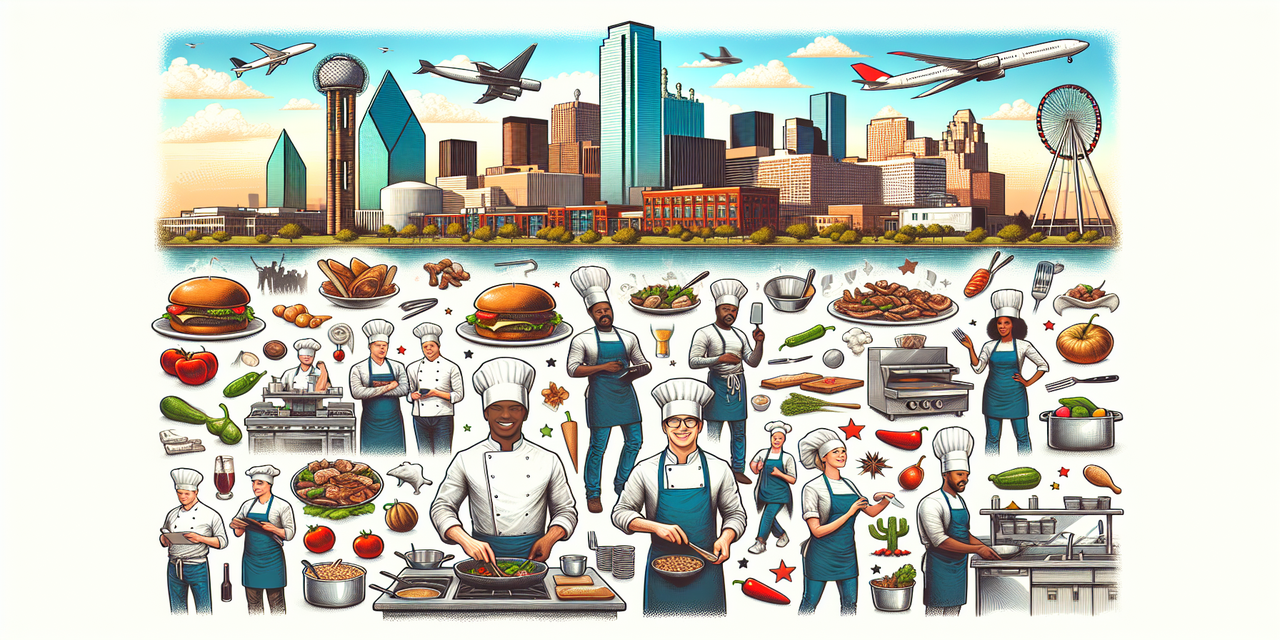Day in the Life of a Chef in Dallas: Key Takeaways
- Chefs in Dallas handle menu planning, food prep, kitchen management, inventory, and quality control daily.
- They face challenges like long hours, high-pressure environments, staff management, and sourcing fresh ingredients.
- Success tips include effective communication, time management, continuous learning, team building, and work-life balance.
A typical day for a Dallas chef blends culinary creativity with leadership and operational responsibilities to deliver exceptional dining experiences.
Chefs who aim to excel may find value in resources like how chefs stay inspired to maintain creativity and motivation.
This article explores their key duties, everyday challenges, and valuable tips to succeed in this fast-paced role.
1. Key Duties of a Chef in Dallas
A chef’s day involves more than just cooking; it demands a combination of creativity, management skills, and attention to detail. Their core responsibilities include:
Menu Planning and Innovation
Chefs craft menus that showcase seasonal ingredients and appeal to the diverse tastes of Dallas diners. This requires researching food trends and staying connected with local suppliers to design fresh and exciting dishes.
Employers can learn about how to effectively hire a cook to support menu innovation and food preparation needs.
Food Preparation and Quality Control
Overseeing the entire cooking process ensures every dish meets high standards. Chefs taste test dishes, inspect ingredient quality, and refine cooking techniques for consistency and flavor.
Kitchen and Staff Management
Managing kitchen staff includes assigning tasks, supervising food preparation, and ensuring smooth workflow. Leadership skills are critical to maintaining motivation and productivity during busy shifts.
For those managing kitchens, the kitchen manager job description can provide insight into effective leadership and management.
Inventory and Supply Management
Tracking stock levels and ordering supplies helps control costs and reduces waste. Chefs must anticipate ingredient needs while balancing budget constraints.
Understanding the role of an inventory manager can help chefs improve supply management.
Health and Safety Compliance
Strict adherence to health codes and hygiene protocols is vital. Chefs ensure the kitchen environment is safe and sanitary to prevent contamination and protect customers.
2. Challenges Faced by Chefs in Dallas
Working as a chef in Dallas is demanding. The fast pace and high expectations create several challenges:
Long and Irregular Working Hours
Chefs typically work extended shifts including nights, weekends, and holidays, which may impact their personal time and stamina. This schedule requires dedication and resilience.
Managing High-Pressure Environments
The kitchen is intense and fast-moving. Chefs must stay calm under pressure and make quick decisions to ensure orders are executed perfectly and on time.
Staff Recruitment and Retention
Finding and keeping skilled kitchen staff can be difficult. Chefs invest time in training and developing their teams to foster loyalty and maintain a positive work culture.
To assist with these challenges, employers can refer to this retaining a chef guide for staffing solutions.
Sourcing Quality Ingredients
Availability of fresh, high-quality ingredients can vary by season and supplier. Chefs need to build strong vendor relationships and adapt menus to what’s accessible without sacrificing quality.
3. Tips for Successful Chefs in Dallas
Thriving in Dallas’ vibrant culinary scene involves more than culinary skill alone. Effective strategies include:
Effective Communication Skills
Clear communication with the kitchen team minimizes errors and streamlines operations. Regular briefings and feedback help align everyone toward common goals.
Mastering Time Management
Prioritizing tasks and setting realistic goals for shifts can reduce stress and improve efficiency. Time management is key to juggling multiple responsibilities smoothly.
Employers interested in enhancing productivity may find this resource on time management for busy restaurants helpful.
Commitment to Continuous Learning
Staying updated on culinary trends and refining cooking techniques can open doors for career growth. Chefs benefit from ongoing training and experimenting with new recipes.
Building and Nurturing Team Culture
Fostering a supportive and positive work environment improves staff morale and collaboration. Team building activities and recognition motivate kitchen staff to perform their best.
Maintaining Work-Life Balance
Encouraging de-stressing practices and respecting personal time prevent burnout. Healthy work-life balance is crucial for sustaining long-term success in the demanding culinary field.
4. Resources for Chefs in Dallas
For chefs looking to stay compliant with regulations and enhance their professional growth, these official resources are invaluable:
- U.S. Department of Labor - Fair Labor Standards Act (FLSA): Information on labor laws including working hours and wage standards.
- Texas Department of State Health Services - Food Establishments: Guidelines on food safety and sanitation regulations in Texas.
- City of Dallas - Food Protection and Education: Local food safety resources and compliance information specific to Dallas.
Day in the Life of a Chef in Dallas: Conclusion
Being a chef in Dallas involves juggling creative culinary duties with demanding managerial and operational tasks. Despite challenges like long hours and high pressure, chefs who communicate effectively, manage time well, build strong teams, and maintain balance can excel.
The dynamic Dallas food scene provides ample opportunities for chefs to grow and showcase their talents by delivering excellence every day in the kitchen.
Chefs and restaurant owners alike can benefit from understanding the roles of restaurant operations directors versus managers when expanding their teams.

.png)

.png)
.jpg)